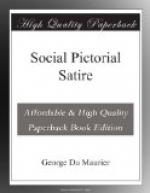Once a Week had just appeared, and The Cornhill Magazine. Sir John Millais and Sir Frederick Leighton were then drawing on wood just like the ordinary mortals; Frederick Walker had just started on his brief but splendid career; Frederick Sandys had burst on the black-and-white world like a meteor; and Charles Keene, who was illustrating the Cloister and the Hearth in the intervals of his Punch work, had, after long and patient labour, attained that consummate mastery of line and effect in wood draughtsmanship that will be for ever associated with his name; and his work in Punch, if only by virtue of its extraordinary technical ability, made Leech’s by contrast appear slight and almost amateurish in spite of its ease and boldness.
So that with all my admiration for Leech it was at the feet of Charles Keene that I found myself sitting; besides which we were much together in those days, talking endless shop, taking long walks, riding side by side on the knife-boards of omnibuses, dining at cheap restaurants, making music at each other’s studios. His personal charm was great, as great in its way as Leech’s; he was democratic and so was I, as one is bound to be when one is impecunious and the world is one’s oyster to open with the fragile point of a lead-pencil. His bohemian world was mine—and I found it a very good world and very much to my taste—a clear, honest, wholesome, innocent, intellectual, and most industrious British bohemia, with lots of tobacco, lots of good music, plenty of talk about literature and art, and not too much victuals or drink. Many of its denizens, that were, have become Royal Academicians or have risen to fame in other ways; some have had to take a back seat in life; surprisingly few have gone to the bad.
This world, naturally, was not Leech’s; if it had ever been, I doubt; his bohemia, if he ever had lived in one, had been the bohemia of medicine, not of art, and he seemed to us then to be living on social heights of fame and sport and aristocratic splendour where none of us dreamed of seeking him—and he did not seek us. We hated and despised the bloated aristocracy, just as he hated and despised foreigners without knowing much about them; and the aristocracy, to do it justice, did not pester us with its obtrusive advances. But I never heard Leech spoken of otherwise in bohemia than with affectionate admiration, although many of us seemed to think that his best work was done. Indeed, his work was becoming somewhat fitful in quality, and already showed occasional signs of haste and illness and fatigue; his fun was less genial and happy, though he drew more vigorously than ever, and now and again surprised us by surpassing himself, as in his series of Briggs in the Highlands a-chasing the deer.




